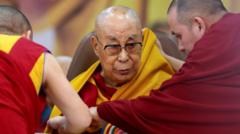The Dalai Lama's upcoming announcement regarding his successor seeks to navigate the complex political and cultural landscape surrounding Tibetan Buddhism. Born Tenzin Gyatso in 1935 in what is now Qinghai Province, he became Tibet's spiritual leader at age 2 after being recognized as the reincarnation of the 13th Dalai Lama. Following the Chinese military's invasion of Tibet in 1950, he ascended to political leadership at 16 and fled to India in 1959 amidst rising tensions, where he has remained in exile ever since.
The current Dalai Lama’s comments indicate a shift in how future reincarnations might be determined, with a focus on safeguarding Tibetan Buddhism from external influences, particularly from the Chinese government. China's approach to the succession of the Dalai Lama has raised concerns; Beijing seeks to exert its authority over Buddhism in Tibet by either appointing its own chosen leader or manipulating the validation of future Dalai Lamas.
Reflecting on his legacy, the Dalai Lama’s new succession approach may ultimately ensure that Tibetan Buddhism remains a pillar of Tibetan identity, untainted by outside interference. The significance of this development not only affects Tibetan monks and practitioners but also reverberates through global discussions on religious freedom and cultural autonomy in the face of authoritarian regimes. As the world watches, the forthcoming plan for selecting a successor challenges both spiritual custom and geopolitical dynamics.
The current Dalai Lama’s comments indicate a shift in how future reincarnations might be determined, with a focus on safeguarding Tibetan Buddhism from external influences, particularly from the Chinese government. China's approach to the succession of the Dalai Lama has raised concerns; Beijing seeks to exert its authority over Buddhism in Tibet by either appointing its own chosen leader or manipulating the validation of future Dalai Lamas.
Reflecting on his legacy, the Dalai Lama’s new succession approach may ultimately ensure that Tibetan Buddhism remains a pillar of Tibetan identity, untainted by outside interference. The significance of this development not only affects Tibetan monks and practitioners but also reverberates through global discussions on religious freedom and cultural autonomy in the face of authoritarian regimes. As the world watches, the forthcoming plan for selecting a successor challenges both spiritual custom and geopolitical dynamics.



















